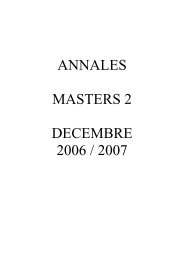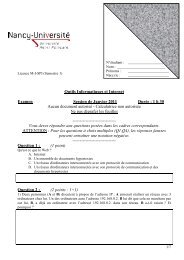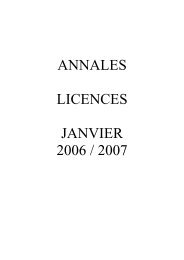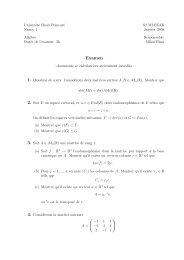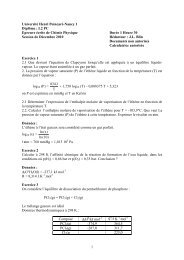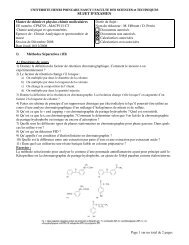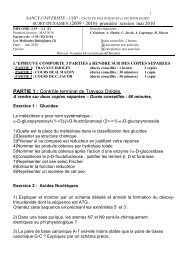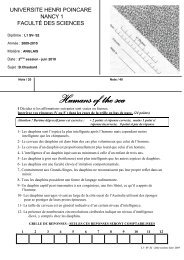Juin 2005
Juin 2005
Juin 2005
You also want an ePaper? Increase the reach of your titles
YUMPU automatically turns print PDFs into web optimized ePapers that Google loves.
tj Similar problems areoccurring to sorneextentin the US.Accordingto Joe Commins,a geneticistfrom the University ofWestemOntarioin Canada, studies ofthe impactofherbicides, particularly glyphosate, on soil." rnicrobialcommunities haverevealedincreasing colonisation of theroots ofRoundupReadysoya with the fungusFusarium in Midwestem fields.Argentina's fanners arealso havingto dealSwith the proliferation of"volunteer"soya,which sproulsfrom seeds dropped duringharvest and whichcannot be eradicatedwithnormal doses ofglyphosate.This has createdmarketing opportuniries for other'vagrochemical companiessuch as Syngenta,which has been placingadvertswith the slogan"Soya is a weed" advisingfarmers touseamixture ofparaquat andatrazine to eradicatevolunteer soya. Other companies, including;5 Dow AgroSciences, are recommending mixingglyphosate with other herbicides, such asmetsulfuron and clopyralid.Market forcesNotan scientists in Argentina are convincedthat the fanners' problems havebeencausedL' by heavy useofglyphosate, and otherssay thatthedifficulties are notyetcritical. "We areexperiencing sorne problems oftolerant weeds,but theyarenot on a largeenoughscaleta affectoverall yields seriously ortojeopardise the,; future of soyafarming," saysCarlosSenigalesi,director of investigative projectsat !NTA. Hebelievesitis thetendency forfarmers tagrownothing butsoya,ratherthan theprevalence ofGM strains,whichis al theroot of theproblem.(; "Monoculture is notgood forthesoilsorforbiodiversityand the govemment shouldbeencouraging farmers to return 10 crop rotation,"Senigalesi says."But hereeverything is lefttothemarket. Fanners haveno proper guidanceS from theauthorities. There are no subsidiesorminimum priees. I think we must be theonlyArpnUna's flrmers lire UJlng more Ind more IInd to lfOW pnetlallJ modlfied SO)'I,lSOOO_011 c~ 150001000050001991198\998/99'country inthe world wheretheauthorities do 3evmonoculture. Itis also startingto sufferfromnothavea proper plan foragriculture butleaveeverything to marketforces.":0 Forthefirst timehowever,INTA recently soya, sayingthat fanners werebuying aboutexpressedconcem. ln a report publishedinDecember it criticised "the disorderly process llO-depriving thecompany ofroyalties.ofagricultural development", waming that ifnothingwas done,a declinein production was\5'inevitableand thal the country's"stock ofnatural resources will suffera (possiblyirreversible) degradationboth in quantityand 31.'The countryhas adopted GM technology-quality". Il calledfor changesin fanning[practicesin the Pampas,sayingthatthe!,combination of'no-tillwith soyamonoculturewas "not a sustainable alternative 10 croprotationfarming", Il also wamed that,in the 315 current use ofRoundup Ready,1dont thinkilsnorth, soyafarming"is notcompatible withthesustainability offarming".I~Monsanto's Argentinian headquarters hasused to comment directlyon thesemajor suppliersoffood, particularlywheat andaccusations. Butthecompany hasexpressed ~() beef.Butthe"soyarisation" of the economy, asthe Argentinians call it, has changedthat.concern about thesituation, saying itbelievesthatcroprotation is moresustainable thanAbout 150,000sma1l farmers have been drivenoff the land. Production ofmany staples,thelackofgovemment controls. In January itmcluding milk, rice, maize, potatoes andlentils,has fa1len sharply.JlSunexpectedlyhalted sales of RoundupReady Manysee Argentina's experience as awarning ofwhat CaTIhappen whenproductionhalf oftheir seeds on the black market and of a single commodity for the world markettakes precedence over concern forfoodTo Benbrook, thisadds up ta a veryworryingoutlook."Argentinafacesbigagronomie problems that it has neither theresources northeexpertise to solve," he says.security. When thiscommodity is produced in 3.?! 1:'a system of nearmonoculture, withtheuse ofa new and relatively untested technologyprovidedby multinational companies, themore rapidly and more radicallythan anyvulnerability ofthe country is compounded.As yet, few countrieshave optedfor GM 33Sother country in the world.Jt didn't takeproper safeguards to manage resistance and totechnology: the US and Argentina togetheraccount for 84 per cent of the GM cropsprotect thefertility ofits soils.Basedon the planted in the world. But as others, includingagriculture is sustainable formorethanthe UK, seem increasingly prepared toauthorise the commercial growing ofGM .4 çanother coupleof years."Argentina usedto be one of the world'scrops,they may be we1l advisedto look toArgentina to see how it can go wrong.•Sue Branford isa freelance journalist specialisinginlatinAmerica



